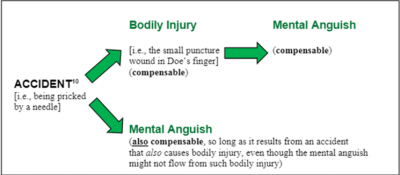Survivors of Aviation Crashes and Mishaps Can Recover for Psychological Injuries
 By: Timothy S. Tomasik and Eddie Hettel
By: Timothy S. Tomasik and Eddie Hettel
Contrary to what airlines often assert, in many cases, victims of airline crashes can recover for both their physical injuries and the psychological injuries attributable to the crash. Under Article 17(1) of the Montreal Convention of 1999, a multilateral treaty concerning compensation for the victims of air disasters, psychological injury alone is not sufficient for a claimant to recover damages against an airline. However, courts have awarded damages for such injuries that are “traceable to” the crash itself, so long as a physical injury is also present.
Historically, courts required a mental injury to “flow from” a physical injury to be compensable. See Eastern Airlines v. Floyd, 499 U.S. 530 (1991) (passengers on flight with imminent belief of crash in Atlantic Ocean could not recover for mental injuries alone); see also In re Air Crash at Little Rock Arkansas, on June 1, 1999, 291 F.3d 503, 511 (8th Cir. 2002) (in accordance with the “flowing from” rule, plaintiff could only recover emotional damages which flowed from her physical injuries, not the incident itself). However, these cases were decided under the Warsaw Convention, the predecessor to the Montreal Convention.
In a case of first impression interpreting the Montreal Convention, the United States Court of Appeals for the Sixth Circuit ruled that a carrier is liable for the damages sustained by a passenger, including mental or emotional damages, as long as these damages can be traced to the original accident, no matter whether the damages were the direct result of the person’s bodily injury. In Doe v. Etihad Airways, P.J.S.C., Jane Doe, the plaintiff, and her daughter flew on an Etihad Airways flight from Abu Dhabi to Chicago. 870 F.3d 406, 409 (6th Cir. 2017). During the flight, Doe reached into a seatback pocket, and her hand was pricked by an unseen hypodermic needle inside the pocket. She gasped, and due to the prick from the needle, blood was drawn from her finger. The plaintiff pursued damages from Etihad Airways based on the physical injury she suffered, as well as “mental distress, shock, mortification, sickness and illness, outrage and embarrassment from natural sequela of possible exposure to” various diseases.
The court provided the following diagram to illustrate the types of damages that can be recovered under Article 17(1) according to its textual interpretation.

The Sixth Circuit found that the accident that occurred on an Etihad Airways aircraft led to the plaintiff’s bodily injury, and because of this, the plaintiff was entitled to recover compensation for the mental anguish she experienced, no matter whether her anguish was the direct result of her bodily injury or was more generally caused by the incident that led to the injury. In either case, the plaintiff’s mental anguish was considered to be “damage sustained in case of”—i.e., “in the event of” a bodily injury that was eligible for compensation.
Contact a Chicago Aviation Injury Lawyer
At Tomasik Kotin Kasserman, LLC, our attorneys have extensive experience in cases involving plane crashes and aviation-related injuries. Attorney Timothy Tomasik has prosecuted multiple high-profile lawsuits, and he helped secure a settlement of $1.2 billion from airline companies based on security breaches that led to the hijackings on September 11, 2001. Contact our Cook County plane crash injury attorneys at 312-605-8800 to arrange a free consultation today.

 312-605-8800
312-605-8800




 312-605-8808
312-605-8808






